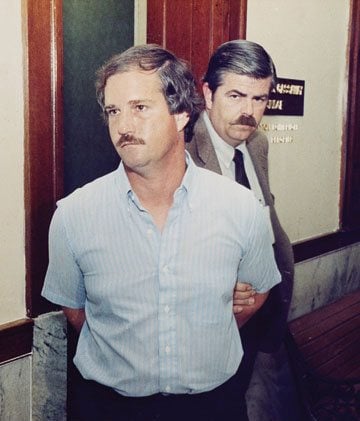The Arson Files: Ed Graf Wins New Trial

Texas’ highest criminal court on Wednesday overturned the arson conviction of Ed Graf who’s served nearly 25 years of a life sentence for a crime he likely didn’t commit.
In a two-page opinion, the Texas Court of Criminal Appeals ruled that the arson evidence used to convict Graf of burning to death his two stepsons in a Waco suburb in August 1986 was flawed. “This false testimony violated [Graf’s] due process rights,” the judges wrote. But while they threw out the original conviction, the judges stopped short of declaring Graf actually innocent. That means he will be sent to the McLennan County jail in late April to wait for county prosecutors to decide if they will seek a new trial or set Graf free. The McLennan County DA’s office released a statement on Wednesday saying it’s still examining the case.
If prosecutors pursue a new trial, they will have to win a conviction without the use of much evidence of arson. Three nationally known fire scientists have examined the Graf case and found no evidence of arson. The prosecutors’ own expert who recently looked at the case also found no indicators of arson. At a January hearing, fire scientist Doug Carpenter delivered devastating testimony that the fire and toxicology evidence disproved the prosecution’s theory of how Graf set the fire.
Graf was convicted of drugging his 8- and 9-year-old stepsons, dragging them into a shed behind his house in Hewitt, pouring gasoline on the floor, locking the door and setting the shed on fire. The forensic evidence for this scenario has fallen apart. Autopsies found no drugs in the boys’ bodies; there’s no evidence gasoline was poured on the floor, arson experts say the door to the shed must have been open or the fire would have died from lack of oxygen. The other evidence that investigators once thought were indicators of arson has been disproved in the two decades since the fire. As Carpenter testified in January, the high levels of carbon monoxide in the boys’ blood point to an accidental fire, not one intentionally set with gasoline.
The Observer wrote the first in-depth investigation of the Graf case in May 2009, part of a four-part series on flawed arson cases. (Read our original story on Graf’s case here.)
The Graf case is the first Texas arson conviction overturned since the controversy over the execution of Cameron Todd Willingham, put to death in 2004 on similarly flawed arson evidence. The Graf case is also being examined by a panel of fire experts reviewing Texas arson cases in partnership with the Texas Innocence Project. The panel will meet in early April when it’s expected to make recommendations on the Graf case. That may help sway prosecutors’ decision on whether to launch a new trial. They can take as long as they want to make a decision. It could still take months or years to win his release.
So while Wednesday’s ruling was undoubtedly welcome news for Graf and the many other Texans still in prison on faulty arson convictions, his attorney remains cautious.
“It’s good news,” said Walter Reaves, who’s been worked to free Graf for more than five years, “but there’s still a long way to go.”
